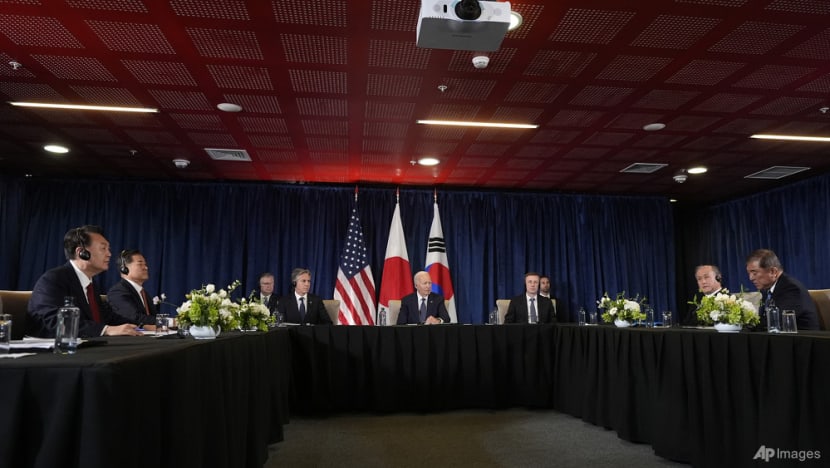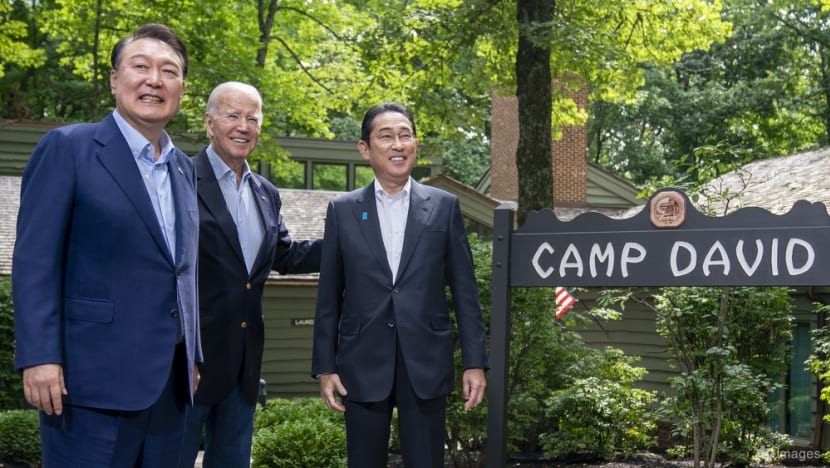Advertisement
One failed martial law plot in South Korea later, East Asia is down a more turbulent path in the era of Trump 2.0, says professor of political science Robert Kelly.

A trilateral meeting with the US, South Korea and Japan at the APEC summit in Lima, Peru, Nov 15, 2024. (Photo: AP/Manuel Balce Ceneta)
New: You can now listen to articles. 
This audio is generated by an AI tool.

13 Jan 2025 06:00AM (Updated: 13 Jan 2025 09:16AM)
BUSAN: The Japan-South Korea-United States relationship has been strong for the past few years, thanks to a happy domestic alignment that currently exists.
In Japan, where the left is rarely elected, a moderate conservative willing to admit imperial misbehaviour must be prime minister. In South Korea, where the left is relentlessly anti-Japanese, a conservative, anti-communist, pro-American president is necessary. And in the US, the president must be a committed internationalist who supports alliances and believes in the forward-basing of US military power.
But this is about to fracture. Come Jan 20, former US president Donald Trump will return to the White House.
In South Korea, the current conservative, pro-American president, Yoon Suk Yeol, has been impeached after declaring martial law last month in what has been widely perceived as an anti-democratic power grab. He has resisted summons and arrest so far, but his removal from office in the coming months will be inevitable.
Once Yoon is out, an election must be held within 60 days. The left will likely triumph as it did in an analogous, post-impeachment election in 2017 after another conservative president was removed.
That makes the left-progressive Lee Jae-myung the likely next president of South Korea. Lee has spoken sharply of Japan, as did his progressive predecessor Moon Jae-in.
Though Japan and South Korea are particularly exposed to the threat of China, they struggle to cooperate. The tension between the two countries over historical grievances has not faded much over time.
Japan was an imperial power in Korea from 1910 to 1945. Its treatment of Koreans was poor, and both North and South Korea perceive that Japan is not sufficiently contrite. Japan, conversely, feels that it must over-apologise and that the Korean issue will not go away no matter what it says or does.
DONALD TRUMP WILL NOT PLAY JAPAN-SOUTH KOREA MEDIATOR
The US, as a common ally to both, has often played a bridge or mediating role. Although a three-way alliance is impossible, the US has promoted trilateral cooperation on security issues.
Where predecessor Joe Biden put real effort into this traditionally challenging issue, Trump will make no effort to mediate Japanese-South Korean disputes. He had not in his first term. Instead, he took sides in the dispute.
He tilted toward Japan, whose prime minister at the time, Shinzo Abe, adroitly flattered Trump and won him over. Abe even imposed trade sanctions on South Korea in 2019, as retaliation over a Korean court order for Japanese firms to pay compensation to victims of wartime forced labour. The US did not intervene.
The trade dispute is widely considered to be the lowest point in Japan-South Korea relations since diplomatic normalisation in 1965.
In contrast, South Korea’s contemporaneous president, Moon Jae-in often clashed with Trump, trading barbs in the media. When Trump sought a deal with North Korea in 2018-19, he cut Moon out of the negotiations. Trump will likely bring this style back into office.
DRIFTING AWAY FROM EAST ASIA ALLIES
In short, expect trilateral relations to be poor in the coming years, just like during Trump’s first term.

Prospective South Korean leader Lee will end trilateralism just as Moon did. Lee also said that South Korea should not participate in a Sino-American conflict, the single most important US security concern in Asia today.
Were South Korea to stand aside in that conflict, the US-South Korean alliance would collapse immediately. Like Moon before him, Lee will strike a tough line on Japan and will not placate or flatter Trump.
Indeed, Trump’s attention in East Asia will likely be focused on North Korea and China.
That said, Trump will not formally abandon South Korea or Japan. Pushback in the US foreign policy community to an open breach would be intense. Instead, he and the US will simply drift away.
His comments will suggest indifference, perhaps even disdain, and the credibility of US alliance guarantees to South Korea and Japan will decline. Already, no one seriously believes that Trump will fight wars for US allies, especially in East Asia where that likely means nuclear escalation.
COULD SEOUL AND TOKYO FIND THEIR OWN WAY?
Ideally, partial “abandonment” would force South Korea and Japan to find their own way to rapprochement.
It might even have been a real option in the era of Trump 2.0: Yoon had made it a priority to improve ties with Japan when he took office in 2022, and both countries had taken a significant step at a historic summit hosted by Biden in August 2023.
But one botched attempt at martial law later, this scenario has become impossible. The South Korea left is so hostile to Japan, that a leftist South Korean president would likely consider nuclear weaponisation, or an accommodation with North Korea and China, before alignment with Japan.
East Asian politics are about to become much more turbulent.
Robert Kelly (@Robert_E_Kelly) is a professor of political science at Pusan National University.
